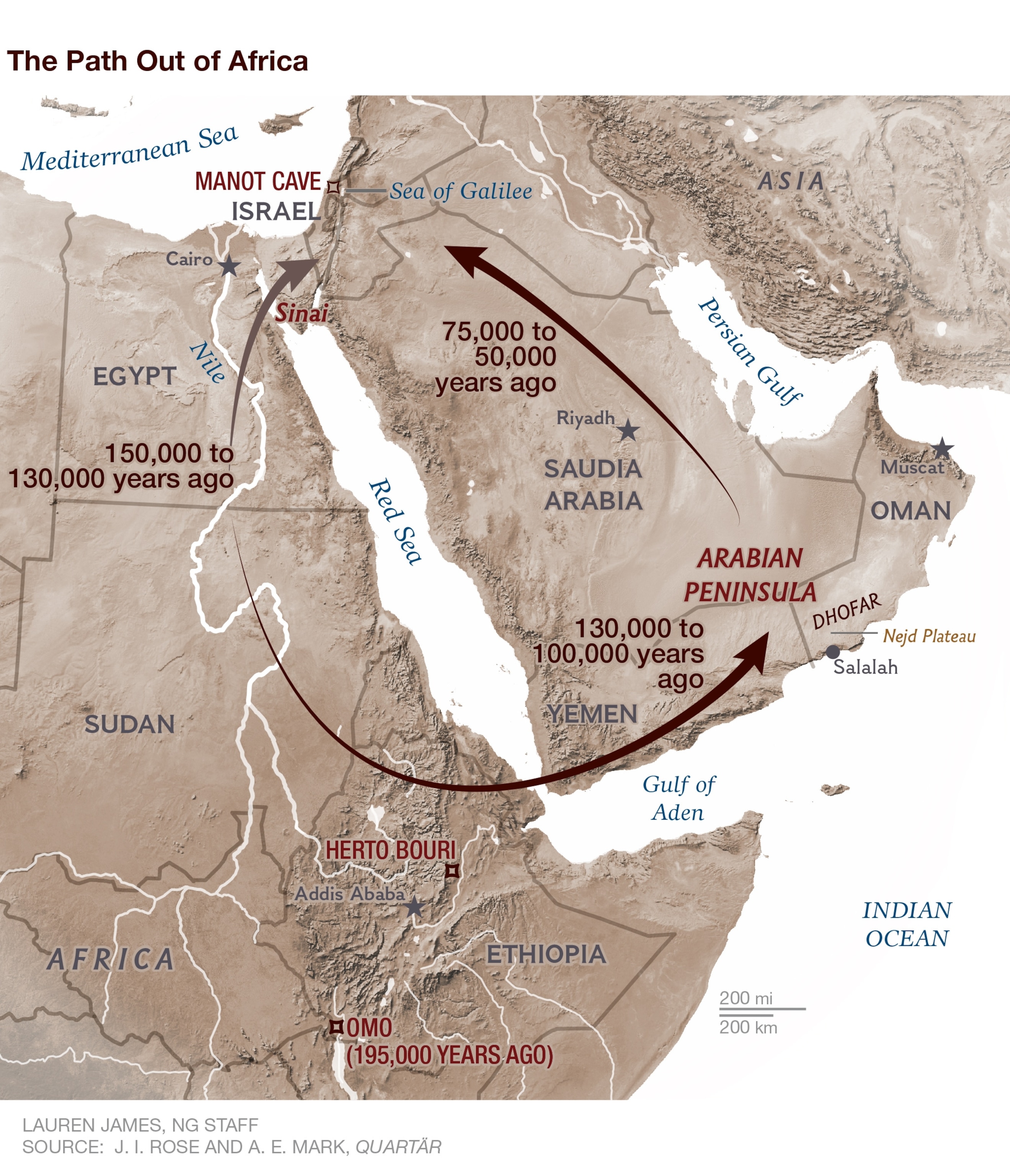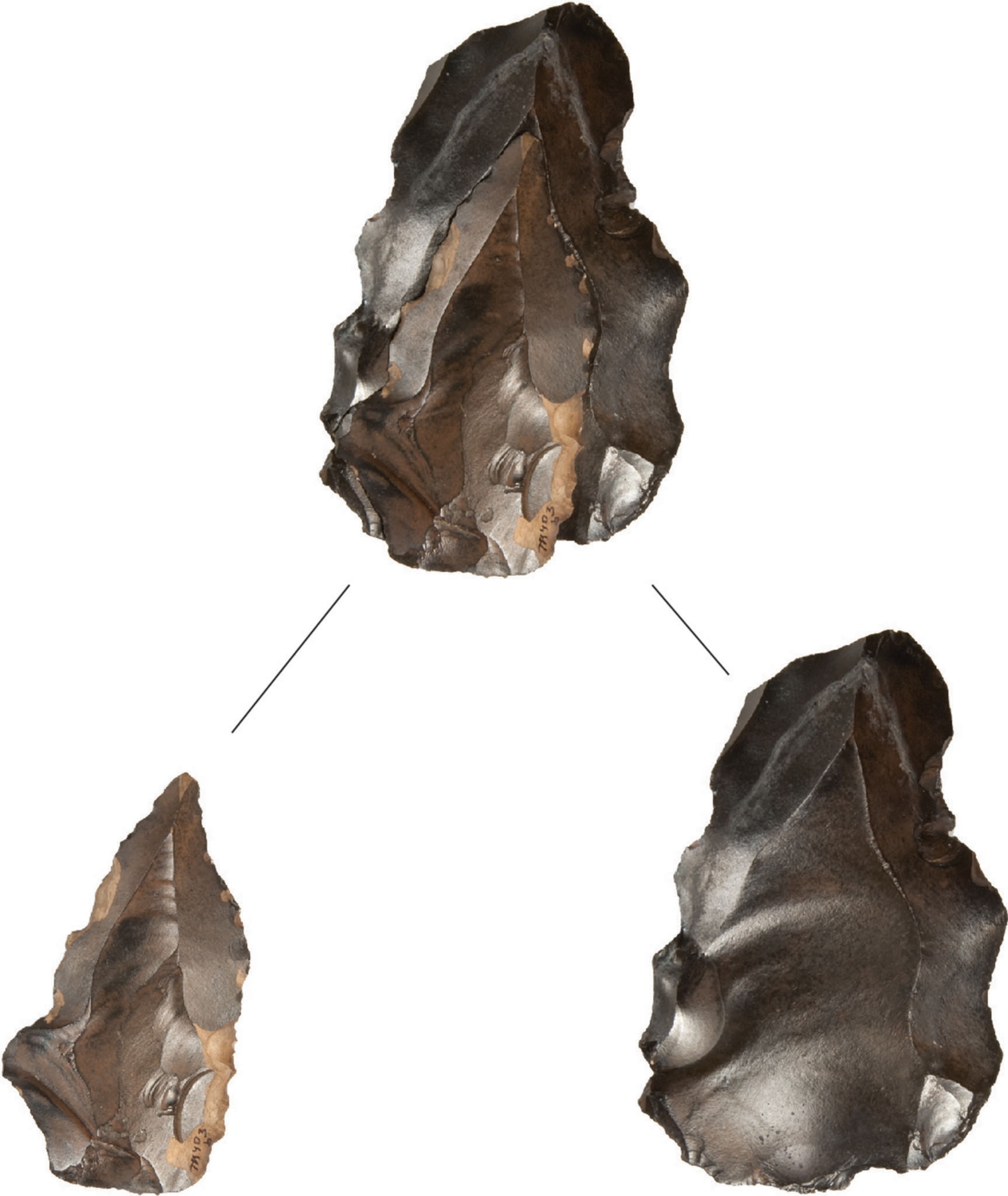
Trail of Tools Reveals Modern Humans' Path Out of Africa
Early Homo sapiens lingered in a lush Arabia before encountering Neanderthals in the Levant.
Where did our species come from, and how did we get from there to everywhere?
Genetic studies have supplied a convincing answer to the first question: Our modern human ancestors evolved in Africa, then swept across Eurasia beginning some 60,000 to 50,000 years ago. Now, a pair of American archaeologists claim to have uncovered the route those early Homo sapiens took on their way to populating the planet.
By following the broken trail of stone tools that modern humans left behind like bread crumbs marking their path, researchers propose that our ancestors took a circuitous path through Arabia, pausing there for some 50,000 years when it was a green oasis. Then they journeyed on to the Middle East, where they first encountered Neanderthals.

Stylistic and manufacturing similarities, the archaeologists say, connect the dots between tools made first in the Nile Valley of Egypt, then in the Arabian Peninsula, and, finally, in Israel. Those tools became progressively smaller and more sophisticated, similar to the evolution of mobile phones today.
"Archaeologists have always focused so much on 'out of Africa and into the Middle East' that we've missed an entire chapter of the human expansion in Arabia," says archaeologist Jeffrey Rose of the Ronin Institute, based in New Jersey, co-author of a new report published this month in Quartär.
Our species' birthplace was in Africa about 200,000 years ago, according to fossils from sites such as Omo and Herto Bouri in Ethiopia. While these fossils look modern, however, the populations they represent didn't begin to act fully modern until later.
A tool kit known as the Emiran, dated to almost 50,000 years ago, defines the transition between archaic and modern human behavior—at least as far as tool-making goes. But since the discovery of the first Emiran tools—points, blades, and scrapers found in a cave near the Sea of Galilee in Israel in 1951—archaeologists have puzzled over where this more advanced way of making tools began.
"The Emiran is the bridge technology," says Rose, who is also a National Geographic Emerging Explorer. "But where did these guys come from?"
Out of ... Arabia?
Working with his former thesis adviser, archaeologist Anthony Marks of Southern Methodist University in Dallas, Rose studied all of the stone tools he could get his hands on in Arabia, northeastern Africa, and the Middle East.
In their new report, the pair says the evolution of stone tools in the region began in the Nile Valley of Egypt 150,000 to 130,000 years ago. These Nilotic hunter-gatherers in Egypt made Nubian tools by chipping away edges of a stone core in a systematic way to produce a single triangular point, which could be attached to a spear, for example.
While other researchers have proposed that the Egyptian Nubian toolmakers moved rapidly to the Middle East, where they invented the Emiran, Rose and Marks argue that they went to Arabia first—and that it was their Arabian descendants who would later develop the Emiran.
In their report, the researchers describe two different types of tool kits that appear to be offshoots of the Egyptian Nubian in Arabia and were developed 110,000 to 50,000 years ago: the Dhofar Nubian and the Mudayyan industries of the Nejd Plateau of Oman.
From the Dhofar Nubian to the Mudayyan, stone points get smaller and more elongated over time, becoming more similar to the Emiran tools, perhaps because the modern humans were using them as projectile points to hunt smaller, quick-moving animals as the climate got drier and finding food became more challenging. The people who made the Mudayyan tools in Oman were most likely hunting small animals like lizards and rodents, says Rose.

In their scenario, Rose and Marks suggest that the Arabian toolmakers pushed north into the Middle East when the climate changed dramatically in Arabia about 75,000 years ago. At that time, Arabia was beset by drought, which parched lakes and underground streams and converted grasslands into sand dunes.
By contrast, the climate began to grow wetter and more humid in the Middle East 60,000 years ago, drawing animals—and hunters—northward, according to the scenario proposed by Rose and Marks. There, modern humans made a major breakthrough: Instead of producing just one tool from a single stone by striking the core in one direction, from top to bottom, as their Nubian ancestors did, they learned how to strike many elongated blades from the top and the bottom of a single core, in succession—a telltale feature of the Emiran and subsequent Upper Paleolithic industries.
Neanderthal Connection
But in a surprising twist, the researchers also propose that the modern humans who made the Emiran were influenced by archaic people, possibly Neanderthals, who left behind fossils in Israel some 70,000 to 50,000 years ago, as well as more primitive tools, called Mousterian. The scientists say the Emiran tools are made in the same systematic manner as Egyptian Nubian tools, but closely resemble the local Mousterian tools.
The timing fits with genetic studies that suggest that modern humans interbred with Neanderthals when they arrived in the Middle East. A 55,000-year-old modern human skull from Manot Cave in Israel, reported last month, has provided new evidence that the moderns were there at the same time as Neanderthals.
Not everyone agrees that the Emiran hunter-gatherers' tool-making was influenced by their Neanderthal neighbors. The Emiran "has nothing to do with Neanderthals," says Harvard University archaeologist Ofer Bar-Yosef, who proposed a decade ago that the Emiran was made by Egyptian Nubians when they moved directly to the Middle East.
Regardless of who influenced the Emiran toolmakers, the long and winding path that led to modern tools may have taken a lengthy detour through Arabia.
"The Arabian region was not just the route to somewhere else, which it has often been considered in various dispersal scenarios," says paleoanthropologist Chris Stringer of the Natural History Museum in London. "It was at times a significant location in its own right for early modern humans and perhaps for Neanderthals too."